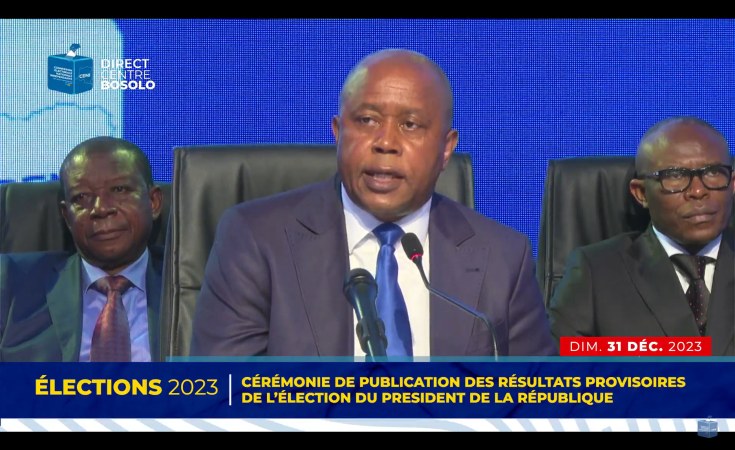Opposition candidates in last week's presidential election in the Democratic Republic of Congo (DRC ) were marching in the capital Kinshasa on Wednesday, despite authorities banning the protest and early results showing the incumbent Felix Tshisekedi with a large lead.
Théodore Ngoy, president of the Congo pour a justice party, told RFI that no ministerial decree or press release had been issue to stop the demonstration.
"It is against democracy, legality, it is against the rule of law," said Ngoy just before the start of the march.
"This ban is unconstitutional. This march is constitutional. We are not seeking to sow trouble or disorder, but we want to peacefully make our voice heard.
"There was a sham election in front of the whole world. The results are also a planned sham."
Most of the opposition candidates in the DRC had called for a joint demonstration over alleged election irregularities in the 20 December election.
#RDC, @MartinFayulu, @DenisMukwege, Théodore Ngoy ( qui lit la déclaration ), Jean-Claude Baende, Lilo Nkema, des candidats présidents de la République confirment leur marche de ce mercredi 27 décembre 2023 pour exiger la réorganisation des élections avec une nouvelle @cenirdc pic.twitter.com/R3UufRJ1CS-- TOP CONGO FM (@TopCongo) December 26, 2023
Martin Fayulu, one of the main challengers to President Felix Tshisekedi, said in an interview that they would march because they were convinced the vote was a fraud.
"We are going to protest because we can't accept another electoral coup d'état," Fayulu told the news agency Reuters.
He was speaking hours after Vice Prime Minister Peter Kazadi said the march had no legal basis and was aimed at undermining the work of the election commission which was still compiling results.
"No government in the world can accept this, so we will not let it happen," Kazadi told a news conference, adding that the opposition should wait for the full results rather than protest.
Call to take the streets
The opposition has also urged supporters to gather near the national assembly in Kinshasa and to march to the headquarters of the country's electoral commission.
Dozens of riot police were stationed in the area on Wednesday morning, according to reports.
Election disputes often fuel unrest in DRC and risk further destabilising Africa's second-largest country, a major cobalt and copper producer plagued by widespread poverty and insecurity in its eastern region.
After a violent campaign, the vote itself was messy, with delayed election kit deliveries, malfunctioning equipment and disorganised voting registers.
The protest organisers have criticised the decision of the election commission known as CENI to extend voting at polling stations that failed to open on election day, calling it unconstitutional and demanding a full re-run of the election.
Some independent observers also said the extension compromised the credibility of the vote.
CENI has acknowledged there were delays on 20 December but has denied that the credibility of the election was compromised by extending some voting.
It started releasing results over the weekend, and its latest tally on Tuesday put Tshisekedi ahead of his 18 challengers, with almost 79 percent of around 6.1 million votes counted so far.
(with Reuters and AFP)


